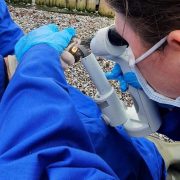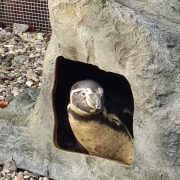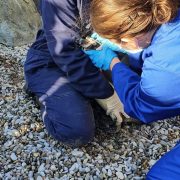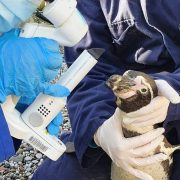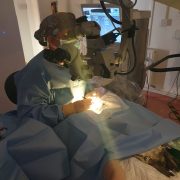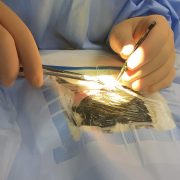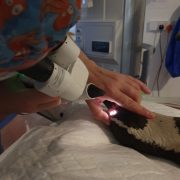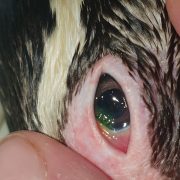When four-year-old Humboldt penguin, Munch, began tripping over himself and struggling during feeding times in the pool with the rest of the colony, a team of expert bird keepers and vets stepped in to investigate.
What they discovered was a deterioration in his eyesight that was so severe that only specialist treatment could save his vision. This is the story of the first penguin at Chester Zoo to ever undergo sight-saving surgery.
It all began when keepers spotted that the young male penguin was having trouble navigating around Penguin Island and that his eyes started to look misty
“We first noticed that Munch had a problem when he started to struggle navigating his way around the nesting areas on Penguin Island. He had also started swimming much slower than normal and struggled to dive for the fish that we’d throw into the pool at feeding times – and if a penguin can’t catch a fish then you know something is amiss. He did though, develop a clever little habit of pulling at my trouser leg to let me know that he hadn’t been able to get any fish, and this gave us an opportunity for closer inspection.
Typically, Munch would confidently make his way around his home and so as soon as we noticed a change in him we immediately called in our vet team. Penguins can live up to the age of 30 and so it’s unusual for a bird so young to develop a loss of sight but that’s where we suspected the problem might lie.”
Parrots and Penguin Keeper, Sophie Bissaker
The vets discovered that Munch had sadly developed cataracts, a disorder that creates cloudy patches on the lens, which develop overtime causing blurry vision, and eventually blindness. He had little sight available to him in his left eye and no vison at all in his right.
Humboldt penguins are vulnerable to extinction in the wild and their numbers have declined in recent years, so the team wanted to do everything they could to try and save Munch’s eyesight. It was clear that he would need to see a specialist. Enter Eye Vet – specialists in animal optical care – who were contacted to see if anything could be done to help Munch to recover his sight.
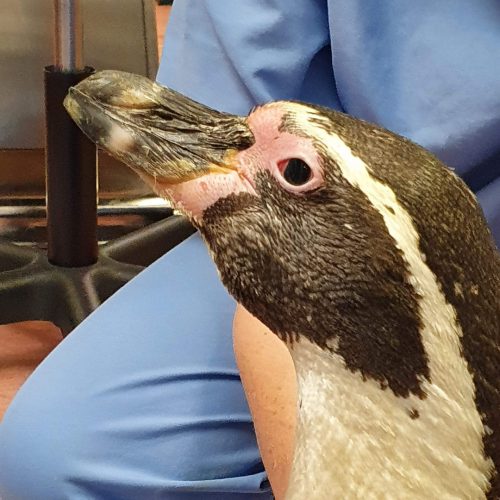
Veterinary ophthalmologist, Iona Mathieson, knew that surgery was the only option for Munch:
“I’ve been in the veterinary field for almost 24 years and Munch was the very first penguin I operated on – they’re not regular clients that’s for sure! Unfortunately, because his quality of life was impacted by the diminished sight, surgery was the only option we had available to us. I had researched penguin cataract surgery and the success rates were good, so we were confident that we could give Munch back his sight.
“We had seen the news about how the coronavirus pandemic had massively impacted the zoo, and this sort of surgery can certainly be costly. Eye Vet was happy to donate their equipment, and I asked some of the staff if they’d be happy to donate their time. We then approached several companies that manufacture specific items that we’d need for the surgery to see if they’d kindly donate to us, and amazingly, they all agreed! We’re really happy to report that the surgery was successful and we are hopeful that Munch will make a full recovery.
“Like many of the staff at the zoo, our team have worked through the lockdowns, so we’re all feeling mentally and physically exhausted, but taking care of Munch was just the morale boost that we all needed. It’s an amazing feeling knowing that we’ve helped to save him, he’s the first thing that made me smile in a long time and caring for him was definitely the best part of my year. We can’t wait to visit Munch and the penguins when the zoo reopens in the future.”
Following his procedure, Munch was initially kept away from the main penguin pool and instead spent time recovering in the zoo’s much shallower nursery pool. He was joined by his life partner, Whurly, who was by his side to keep him company while our keepers monitored his recovery and progress.
Sophie added;
“We needed to separate Munch from the rest of the group for a couple of weeks before and after his surgery. But, as penguins live in colonies and like to be with other birds, Whurly went with him and they had their own little habitat together. I think it was a huge comfort for Munch to know that he wasn’t going through it alone and had his partner by his side. Munch really dotes on Whurly. Wherever she goes, he follows, so I’m sure it provided some much needed comfort. The pair are inseparable and had even their first chick, Leek, in 2019 – they’re a real tight family unit.
“When any animal has a health issue, it’s always emotional. And because of COVID-19 restrictions, the number of people at the surgery was, understandably, kept to a minimum, so it was hard to watch an animal that I care for every day go in for his surgery without being able to be in the operating room with him . I’m so happy that he’s made a speedy recovery and to see him back in the main pool with the rest of the colony, just couple of weeks after his surgery, is just brilliant.
“If we hadn’t of intervened, his sight would have deteriorated and he wouldn’t have any quality of life – he simply wouldn’t have been able to carry on like that. This operation has not only saved his sight, but his life too.
“We’re still giving Munch his daily eye drops to help him heal, but he’s already swimming through the water faster, feeding with the group and waddling around his home with ease. He’s a confident, happy little guy and a real fighter – which considering all he’s been through, is pretty amazing. We are incredibly lucky to have our onsite vet team who dedicate their time and expertise solely to the animals in our care. That, alongside the incredible generosity from the team at Eye Vet, is the reason Munch’s recovery has been so successful.”
NOW is the time to ACT FOR WILDLIFE. Conservation is CRITICAL; species are under threat. TOGETHER we can make a BIG difference. Take action TODAY and join us in PREVENTING EXTINCTION.
OUR TEAM OF EXPERTS WORK IN SIX REGIONS AROUND THE GLOBE – REPRESENTING SOME OF THE PLANET’S MOST BIODIVERSE HABITATS. Discover more about our SCIENCE AND CONSERVATION work.
